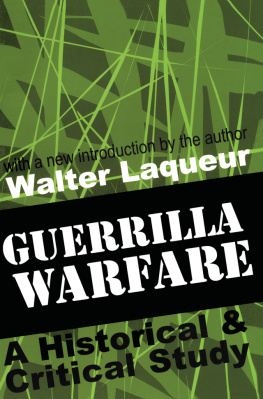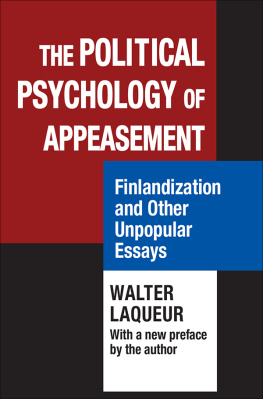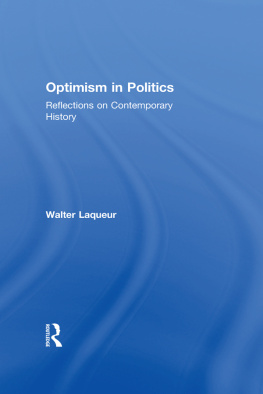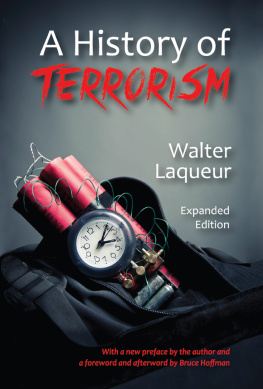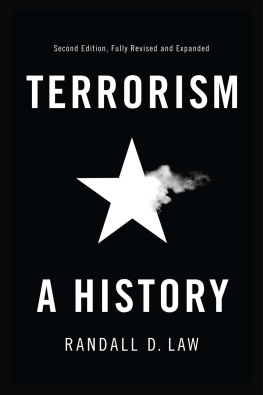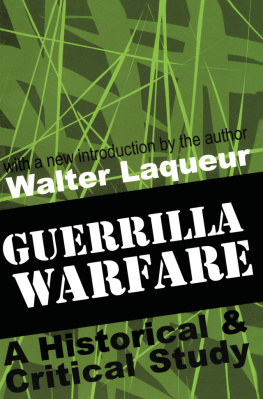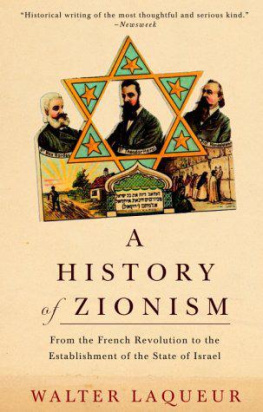Laqueur - A History of Terrorism
Here you can read online Laqueur - A History of Terrorism full text of the book (entire story) in english for free. Download pdf and epub, get meaning, cover and reviews about this ebook. City: New Brunswick, year: 2012;2001, publisher: Taylor and Francis;Transaction Publishers, genre: Politics. Description of the work, (preface) as well as reviews are available. Best literature library LitArk.com created for fans of good reading and offers a wide selection of genres:
Romance novel
Science fiction
Adventure
Detective
Science
History
Home and family
Prose
Art
Politics
Computer
Non-fiction
Religion
Business
Children
Humor
Choose a favorite category and find really read worthwhile books. Enjoy immersion in the world of imagination, feel the emotions of the characters or learn something new for yourself, make an fascinating discovery.

A History of Terrorism: summary, description and annotation
We offer to read an annotation, description, summary or preface (depends on what the author of the book "A History of Terrorism" wrote himself). If you haven't found the necessary information about the book — write in the comments, we will try to find it.
Laqueur: author's other books
Who wrote A History of Terrorism? Find out the surname, the name of the author of the book and a list of all author's works by series.
A History of Terrorism — read online for free the complete book (whole text) full work
Below is the text of the book, divided by pages. System saving the place of the last page read, allows you to conveniently read the book "A History of Terrorism" online for free, without having to search again every time where you left off. Put a bookmark, and you can go to the page where you finished reading at any time.
Font size:
Interval:
Bookmark:
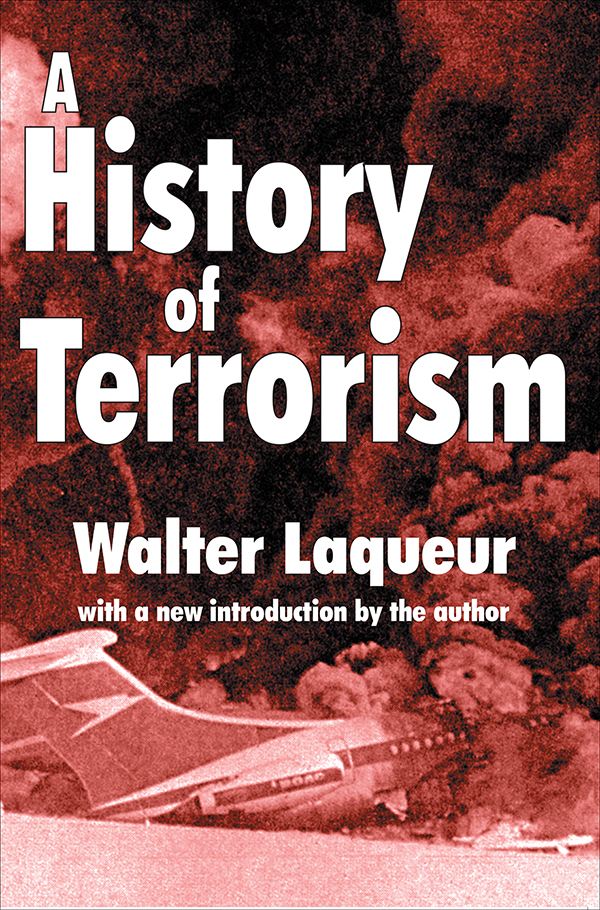
A
History
of
Terrorism
History
of
Terrorism
Walter Laqueur
with a new introduction by the author

Originally published in 1977 by Little, Brown & Co.
Published 2001 by Transaction Publishers
Published 2017 by Routledge
2 Park Square, Milton Park, Abingdon, Oxon OX14 4RN
711 Third Avenue, New York, NY 10017, USA
Routledge is an imprint of the Taylor & Francis Group, an informa business
New material this edition copyright 2001 by Taylor & Francis.
All rights reserved. No part of this book may be reprinted or reproduced or utilised in any form or by any electronic, mechanical, or other means, now known or hereafter invented, including photocopying and recording, or in any information storage or retrieval system, without permission in writing from the publishers.
Notice:
Product or corporate names may be trademarks or registered trademarks, and are used only for identification and explanation without intent to infringe.
Library of Congress Catalog Number: 2001027546
Library of Congress Cataloging-in-Publication Data
Laqueur, Walter, 1921
A history of terrorism / Walter Laqueur; with a new introduction by the author.
p. cm.
Originally published: New York: Little, Brown, 1997.
Includes bibliographical references and index.
ISBN 0-7658-0799-8 (alk. paper)
1. TerrorisHistory. 2. Terrorism. 3. Title.
HV6431.L348 2001
303.62509dc21
2001027546
ISBN 13: 978-0-7658-0799-1 (pbk)
The history of terrorism goes back a very long time, but the very fact that there is such a history, has frequently been ignored or even altogether suppressed. This has to do mainly with the fact that terrorism did not appear at all times with equal intensity, there were periods relatively free of it. As a result, when it reappeared after a period of relative calm there was the tendency to regard it as a new phenomenon, without precedent. Perhaps there was also an inclination to regard its history (if it had one) as of relatively little importance compared with the story of its current sociological background. The psychological study of terrorism was never much in fashion, certainly not in twentieth century, when it was frowned upon, partly because of political correctness (the idea that some groups of people could be more aggressive than others was thought to be not just misguided but abhorrent). But this left a number of crucial questions open: why among people sharing the same convictions did some turn to terrorism whereas others did not? There were also, admittedly, certain objective obstacles that made such psychological studies on a broad basis very difficult indeed.
The present work appeared first in 1977 and, together with its companion volume, Guerrilla (now Guerrilla Warfare), it was translated into seven languages and became a standard text. I tried to show that the study of the history of terrorism was not an idle pursuit but helped to shed some light on certain problems such as the conditions under which terrorism tended to occur and the circumstances in which it prospered or failed. The study of the history of terrorism is not a magic wand, a key to all the mysteries of contemporary terrorism, but, in the absence of other satisfactory explanations, it did provide some useful insights.
The book was also among the first to show that there has been a tradition of terrorist doctrine, at the latest since the early nineteenth century. Students of terrorism were familiar with Bakunin and Nechaev, but the writings of Karl Heinzen and Johann Most (both German by origin, both immigrants to the Untied States) had been forgotten, even though their teachings anticipated, in many ways, the fashionable terrorist thinkers of the 1960s such as Frantz Fanon, Marighela, or Regis Debray.
The history of terrorism does not offer clear-cut lessons simply because conditions varied so much from age to age and from country to country. But certain patterns clearly emerged, among them the fact that terrorism, throughout history, has seldom been politically effective, that it frequently brought about the opposite of what it wanted to achieve (that is to say, greater repression rather than liberation), that Marxism had been more right than wrong in its assumption that mass action was more likely to succeed than the exploits of a few, however desperate or courageous.
Such findings were not universally welcomed at the time and some of the objections deserve to be recalled even a quarter of a century later. Some were opposed to the very idea of studying the history of terrorism (from below), for was it not true that many more people had been killed, more cruelty committed, and more damage caused by terrorist actions committed by governments in peace and particularly in time of war? This attempt to obliterate the dividing lines between various kinds of violence, or at least to belittle their importance, caused nothing but confusion and mischief. That dictatorial governments had caused the death of more people than terrorists was undisputed simply because government possessed infinitely more means of coercion and destruction. But what is to be gained by more or less equating (to give but one example) the Nazi extermination of the Jews with the activities of the Russian terrorists of the nineteenth century? Such obfuscation was not limited to concerned political scientists; it was perhaps even more widespread among the media and the present book, hard as it tried, was not very successful in its battle against the indiscriminate use of labels, deliberate or out of ignorance. It has beenthe fashion among the media for a long time to regard the terms guer rilla and terrorist as synonyms, or to use the term urban guerrilla as an equivalent for terrorism. The media tried to show that they were fair to all parties concerned and since, according to the common wis dom of the time, one mans terrorist was another persons freedom fighter, terms had to be chosen that were not offensive to any side; terrorist was a loaded term and had negative implications, whereas the image of a guerrilla was more positive and was therefore given preference. As I tried to show in this book, there were crucial differ ences between the two even though some extreme movements have used both guerrilla and terrorist tactics. These differences were more clearly recognized by the terrorists themselves than by the media and some of the political scientists. Guevara and Debray were scathing in their condemnation of urban terrorism which, they argued was the grave of the revolutionary movement.
What I wrote about these profound differences was certainly true at the time; it is less true today with the important changes that have taken place in the character of terrorism during the last decade about which more will be said presently.
The misunderstandings about the nature of terrorism in the 1970s were founded, in part, on political reasons. At the time, terrorism was predominantly left wing in inspiration and it did not come as a surprise that commentators belonging to the same political persuasion would produce theoretical explanations which were, at the very least, not un-sympathetic as far as terrorists were concerned. It was argued in these circles that terrorism always occurred where there was oppression, social or national, that the terrorists had genuine, legitimate grievanceshence the conclusion that once the grievances were eradicated, terrorism would also disappear. Terrorism, in brief, was seen as a revolu tionary phenomenon; it was carried out by poor and desperate human beings and had, therefore, to be confronted with sympathetic under standing.
Font size:
Interval:
Bookmark:
Similar books «A History of Terrorism»
Look at similar books to A History of Terrorism. We have selected literature similar in name and meaning in the hope of providing readers with more options to find new, interesting, not yet read works.
Discussion, reviews of the book A History of Terrorism and just readers' own opinions. Leave your comments, write what you think about the work, its meaning or the main characters. Specify what exactly you liked and what you didn't like, and why you think so.

